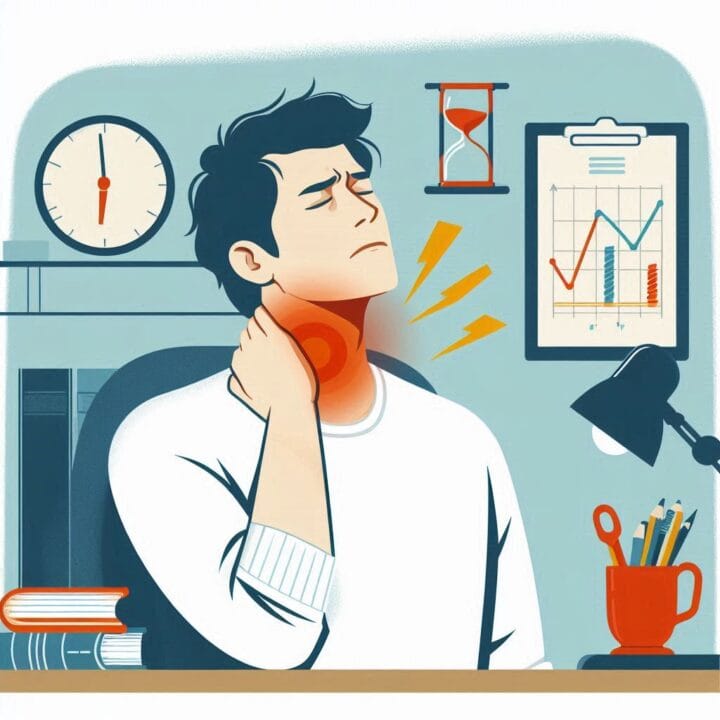Can Neck Pain Cause Head Pain? The Surprising Connection
Table of Contents

Can Neck Pain Cause Head Pain? The Surprising Connection
Is your neck acting up? Does it feel like your head is joining in on the discomfort? You might be surprised to learn that neck pain can indeed lead to headaches. Let’s explore this connection and find out how to ease both your neck and head pain.
The Neck-Head Connection: More Than Just a Coincidence
Neck pain causing headaches isn’t just a figment of your imagination. It’s a real issue that many people face. When your neck is sore or tense, it can send signals of discomfort straight to your head. Here’s how this works:
1. What Happens in Your Neck?
Your neck is made up of bones, muscles, and nerves that work together to support your head and allow movement. When something goes wrong—like tight muscles or an injury—it can affect how everything functions.
2. Pressure Builds Up
When your neck muscles are tight or inflamed, they can create pressure in the surrounding areas. This pressure can radiate to your head, making it feel like you’re carrying a heavy weight up there.
3. Nerve Signals Gone Awry
Your body communicates through nerves. Sometimes, when nerves in your neck are irritated, they send mixed signals to your brain that result in headache pain.
Common Symptoms: How Do You Know?
So how can you tell if your headache is coming from your neck? Here are some signs to look out for:
- Pain Radiating: If you feel pain starting in your neck and moving up into your head, it could be linked.
- Tightness: A feeling of stiffness or tightness in your neck often accompanies these headaches.
- Worsening with Movement: If turning or tilting your head makes the headache worse, that’s a clue.
- Numbness or Tingling: If you experience any tingling sensations in your arms or hands along with the headache, it could indicate nerve involvement.
- Sensitivity: Increased sensitivity to light or sound may accompany these headaches.
If these symptoms sound familiar, you might be dealing with a case of neck-related head pain.
What Causes This Pain?
Now that we know what’s happening, let’s look at what might be causing your neck pain:
1. Poor Posture
In our tech-driven world, slouching over screens has become all too common. Poor posture can lead to muscle strain and discomfort in the neck, which can then trigger headaches.
2. Muscle Strain
Overusing or straining the muscles in your neck—whether from heavy lifting or even sleeping awkwardly—can lead to soreness that travels up into your head.
3. Stress
Stress can cause you to unconsciously tighten the muscles in your neck and shoulders. This tension can easily translate into headaches.
4. Injuries
Injuries from falls or accidents can lead to chronic discomfort in the neck area that may result in headaches over time.
Getting Diagnosed: What to Expect
If you’re experiencing persistent neck and head pain, it’s wise to consult a healthcare professional. Here’s what typically happens during an evaluation:
- Physical Check-Up: A doctor will examine your neck’s movement and look for areas of tenderness.
- Medical History Review: They’ll ask about your symptoms—how long you’ve had them and what seems to trigger them.
- Imaging Tests: In some cases, X-rays or MRIs may be recommended to get a closer look at any underlying issues.
- Nerve Testing: If nerve involvement is suspected, tests may be done to assess nerve function.
Think of this process as piecing together a puzzle; each piece helps clarify what’s going on with your body.
Treatment Options: Finding Relief
If it turns out you have a connection between your neck pain and headaches, don’t worry—there are plenty of ways to find relief:
1. Rest and Modify Activities
Sometimes the best thing you can do is give yourself a break from activities that aggravate the pain.
2. Physical Therapy
A physical therapist can guide you through exercises designed specifically for strengthening and stretching the muscles around your neck and shoulders.
3. Medications
Over-the-counter options like ibuprofen can help manage inflammation and relieve pain. For more severe cases, prescription medications may be needed.
4. Ergonomic Adjustments
Making changes to how you sit at work or hold devices can make a big difference in reducing strain on your neck.
5. Stress Management Techniques
Practices like yoga, meditation, or even simple deep-breathing exercises can help reduce stress levels and ease muscle tension.
Prevention: Keeping Your Neck Happy
An ounce of prevention is worth a pound of cure when it comes to avoiding future issues with neck and head pain:
- Maintain Good Posture: Keep screens at eye level and take breaks when sitting for long periods.
- Stay Active: Regular exercise strengthens muscles and improves flexibility.
- Manage Stress: Find healthy ways to cope with stress through relaxation techniques.
- Sleep Right: Use supportive pillows that keep your spine aligned while sleeping.
- Listen to Your Body: If something doesn’t feel right, don’t ignore it—address it early!
Think of these tips as building blocks for a healthier lifestyle that supports both your neck and overall well-being.
Conclusion: Your Path to Relief Starts Now
So, can neck pain cause head pain? Absolutely! The connection is real, but with the right approach, you can untangle this painful web and find relief. Remember that everyone’s experience with pain is unique; what works for one person might not work for another.
Be patient with yourself as you explore different treatment options and self-care strategies. With time and effort, you can regain control over both your neck discomfort and those pesky headaches.
Ready to take action? Start by trying one of the self-care strategies mentioned above today! Your journey towards comfort starts now!
FAQs
- Can stress really cause both neck pain and headaches?
Yes! Stress often leads to muscle tension in the shoulders and neck, which can trigger headaches as well. - How long does it typically take for treatment options to show results?
This varies by individual; some may see improvements within days while others might need weeks or months of consistent care. - Are there specific exercises I should do for my neck?
Gentle stretches like chin tucks or shoulder rolls are often recommended but consult with a healthcare professional before starting any new exercise routine. - Is poor posture really that big of a deal?
Absolutely! Poor posture puts extra strain on the muscles supporting your spine and can lead directly to both neck pain and headaches over time. - When should I see a doctor about my symptoms?
If symptoms persist beyond a few weeks or worsen despite self-care efforts, it’s best to consult with a healthcare professional for further evaluation.














Post Comment